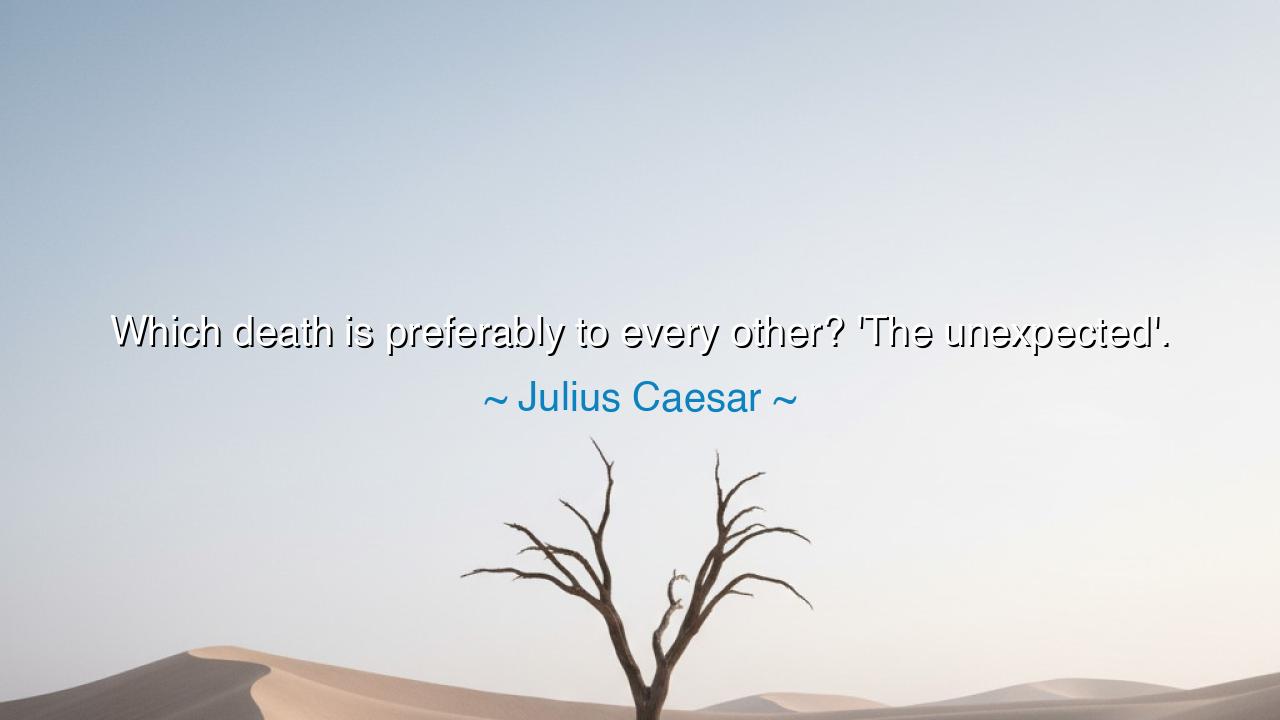
Which death is preferably to every other? 'The unexpected'.






“Which death is preferably to every other? ‘The unexpected.’” Thus spoke Julius Caesar, the conqueror of nations and the architect of empire, a man who held the fate of Rome in his hands. His words, brief yet thunderous, reveal the heart of a warrior and philosopher—one who understood the fragile balance between destiny and will. In this single sentence, Caesar bares the soul of courage: that death, the final companion of all men, should come not as a dread shadow long awaited, but as a sudden breeze that snatches one from life before fear has time to take root. It is a reflection both on mortality and on the kind of life that makes such a death possible.
In the ancient world, the question of how one should die was as important as how one should live. The Stoics—those sages of calm and reason—taught that a noble man must not fear death, for it is only the end of sensation, not the end of virtue. But Caesar’s answer adds something more human, more visceral. He does not ask for a long life, nor for the comfort of forewarning. He asks for a swift and unexpected death, one that comes without the dread of anticipation, without the agony of waiting for fate’s hand to fall. For to die unexpectedly is to die unbroken—to meet one’s end in the full vigor of life, before the soul has bent beneath the weight of fear.
It is a statement that mirrors the life Caesar himself led: bold, relentless, and indifferent to peril. He marched into battle when others hesitated; he crossed the Rubicon when prudence would have counseled retreat. He lived as if each day might be his last—and when death finally came, it did so in the only manner fitting for him: unexpectedly, at the peak of power, in the halls of Rome itself. The blades of his assassins struck without warning, but even in that moment, Caesar met his fate with a kind of grim serenity. In this way, his own death fulfilled his wish—a testament to the life of a man who had long since accepted that mortality is the price of greatness.
History has echoed this truth through countless examples. Consider Alexander the Great, who, like Caesar, strode across the world with divine ambition. He conquered nations, built cities, and dreamed of uniting the earth under one rule. Yet death took him swiftly, in the prime of his glory, without illness or decline, as if the gods themselves envied his brilliance and summoned him early. His passing was indeed unexpected, and though it left empires trembling, it also sealed his legend forever. For what is more tragic—and more beautiful—than to vanish at the height of one’s flame, before the slow dimming that time brings to all?
Yet beyond the heroism of such figures lies a gentler wisdom. The unexpected death is not merely the wish of conquerors—it is the comfort of those who wish to live without fear. Many spend their days in dread of the inevitable, their joy consumed by the thought of its end. Caesar’s words teach us to reverse that thinking: to live so fully, so presently, that death, when it comes, finds us unprepared—but not unworthy. To dwell on death is to die many times; to forget it is to live once, brightly and completely. Thus, the unexpected death is not only a physical event—it is the reward of a life lived in courage and peace.
The ancients understood that fate cannot be mastered, only met with dignity. To welcome the unexpected is to surrender not in weakness, but in trust—trust in the natural order, in the rhythm of existence that gives and takes without cruelty or favor. To die suddenly is to yield oneself to that rhythm without struggle, to pass from being to memory in the same breath. In this way, Caesar’s words are not dark but liberating: they free us from the illusion that we can bargain with time. They remind us that control over death is an illusion, but control over how we live until that moment is the truest power of all.
So, my friends, take from this a lesson worthy of emperors and sages alike: do not fear death—fear only the unlived life. Live in such a way that every day is whole, every act deliberate, every word spoken as if it might be your last. Let courage guide you more than caution; let gratitude triumph over dread. Then, when the unexpected comes—as it must—it will not find you grasping or afraid, but standing upright, heart open, ready to step into eternity as one who has already mastered the art of living.
For in the end, as Julius Caesar teaches us, the greatest death is the one that takes nothing from us—because we have already given everything to life.






AAdministratorAdministrator
Welcome, honored guests. Please leave a comment, we will respond soon